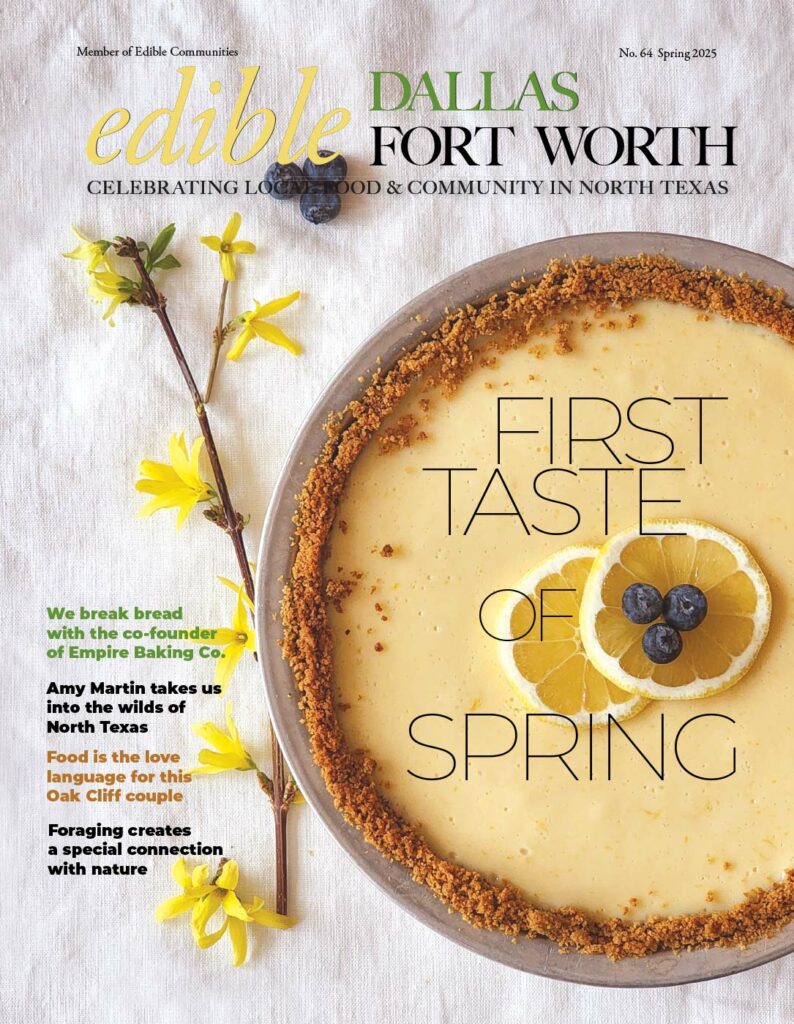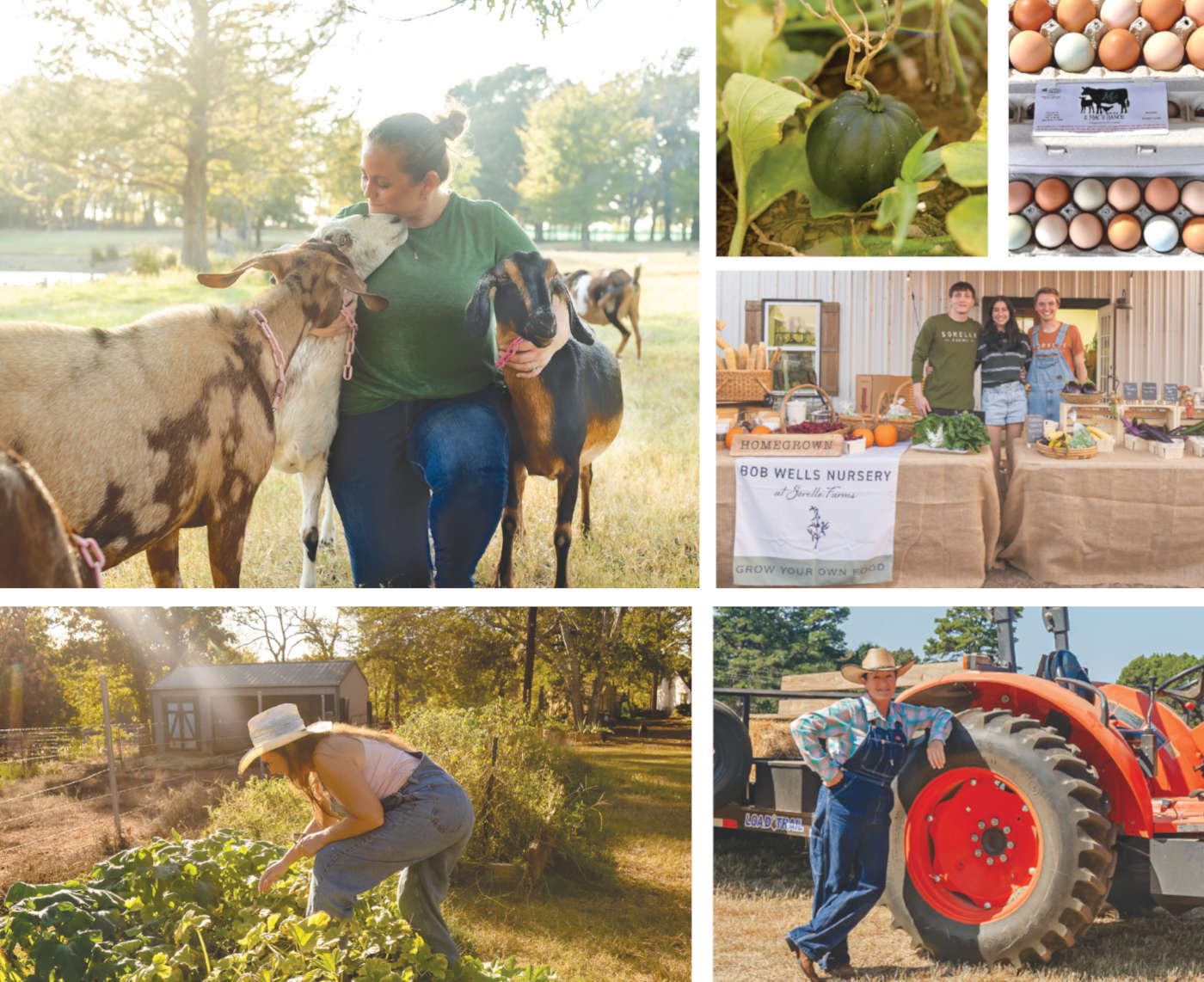
PHOTOGRAPHY BY CLAUDIA CAMARGO
A locavore’s adventure in East Texas
On a breezy Thursday evening in Mineola, farmers and vendors are busy setting up tables full of fresh, beautiful food and homemade goodies as I arrive early to get a first look. In September, Bob Wells Nursery at Sorelle Farms kicked off these weekly Market Nights, bringing community awareness and support for small producers in this part of the Piney Woods in East Texas.
As a long-time supporter and advocate for local farmers in North Texas, I was pretty excited to explore Mineola and get a chance to meet local producers in the area.
I know I’m not alone in my curiosity: all around the State, there’s increasing interest in eating food that is locally grown, seasonal, organic and farm-to-table. This movement is thankfully shining a spotlight on smallscale family farmers and how we all might support a more sustainable food system. It’s become such a thing that there’s even a word for those who choose to eat food grown or produced in their community: locavores.
Locavores want to know where their food comes from and how it’s produced. They also bring awareness to the need for better access to food for everyone, calling for food justice, food sovereignty and good wages for the farmers and workers who help bring healthy food to our table.
In Texas, we’re fortunate to have many small-scale, independent farmers and ranchers. If you’ve explored Wood County—aka the Piney Woods—you’ve seen the natural beauty of both the forests and the farms. When you come explore, I encourage you to seek out these farmers and shake the hand that feeds you.
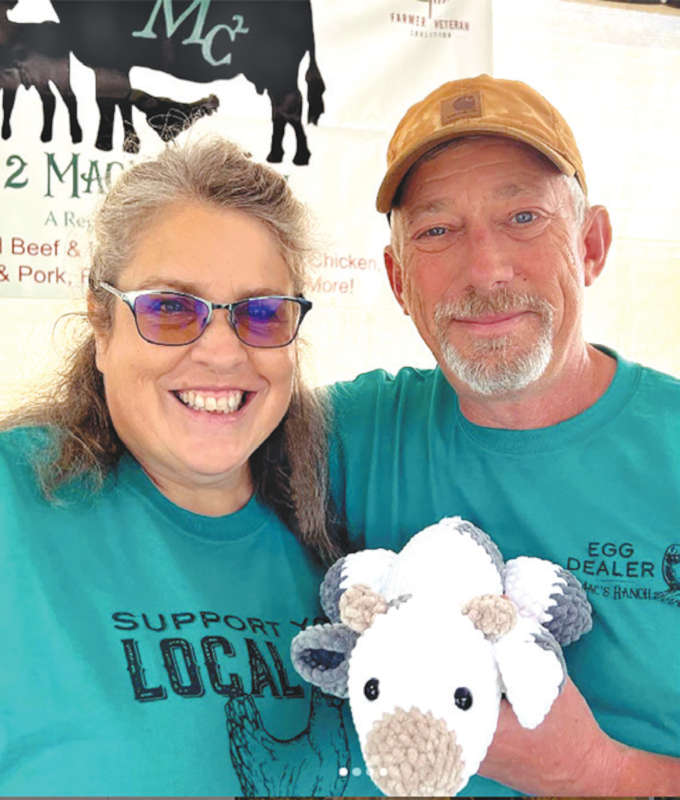
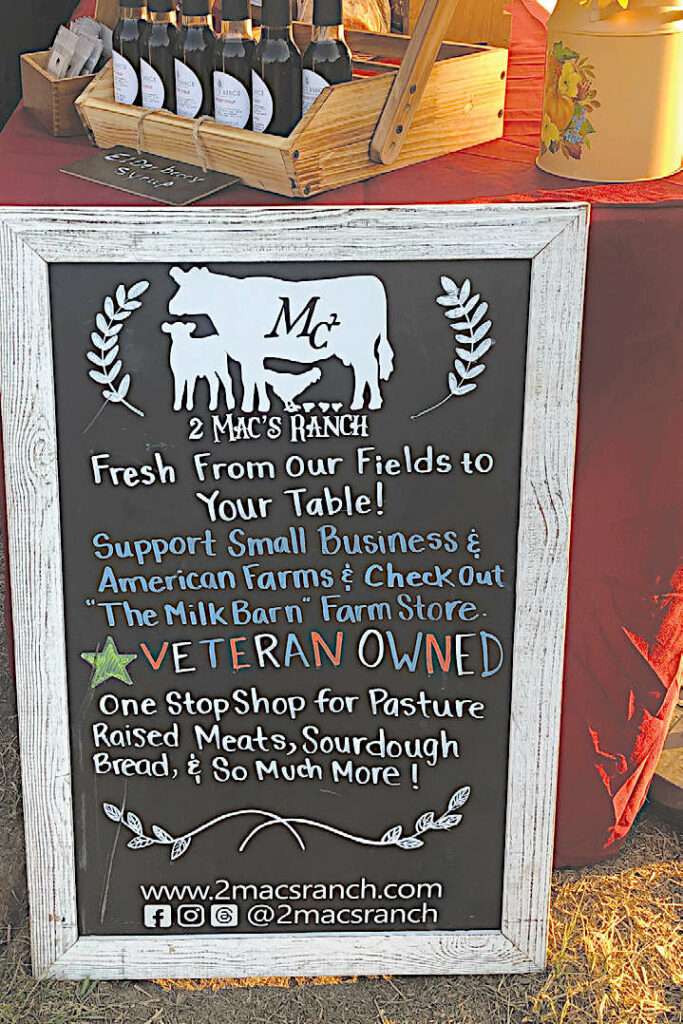
2 MAC’S RANCH AND THE MILK BARN FARM STORE
Winnsboro
Heather and Jim McConnell
2 Mac’s Ranch owners Heather and Jim McConnell raise grass-fed and finished beef and lamb as well as pasture-raised chicken, pork and eggs on their regenerative ranch in Winnsboro. They also grow seasonal produce and plants and make jams, pickles and baked goods that include a delicious dewberry jam, soft sourdough sandwich bread and sourdough focaccia made with their own sourdough starter. When available, you’ve got to try Heather’s bakery-style streusel-topped muffins.
The McConnells manage their 32-acre ranch using techniques that include rotational grazing for their cattle and sheep. This involves moving the animals daily to fresh grass, supplementing their diet with high-quality hay and alfalfa in the winter and providing minerals that ensure the health of animals and soil. Their chickens—raised both for meat and eggs—are raised on pasture in mobile coops that are moved daily for fresh forage and to protect them from predators. Living outside results in meat and eggs with a higher vitamin, mineral and Omega-3 fatty acid profile compared to conventionally raised alternatives.
Their natural approach includes using antibacterial herbs and natural dewormers like pumpkin instead of antibiotics and hormones.
“Buying local supports your neighbors and friends: the dollars spent locally get used again locally, helping support other neighbors,” Jim says. Additionally, “by purchasing locally you know exactly what you are buying and how it was grown, raised or made. In these uncertain times, it’s also important to have reliable food sources and [establish] relationships with local farmers/ ranchers.”
Heather takes on the daily work load, while Jim continues to work as an ER nurse to support the ranch. They envision big plans for the future as they hope to acquire more land and increase their cattle herd to further expand their production. Their products can be purchased at The Milk Barn Farm Store on their farm, as well as at local farmers markets. Farm tours are available by appointment.
2macsranch.com
Facebook @2macsranch
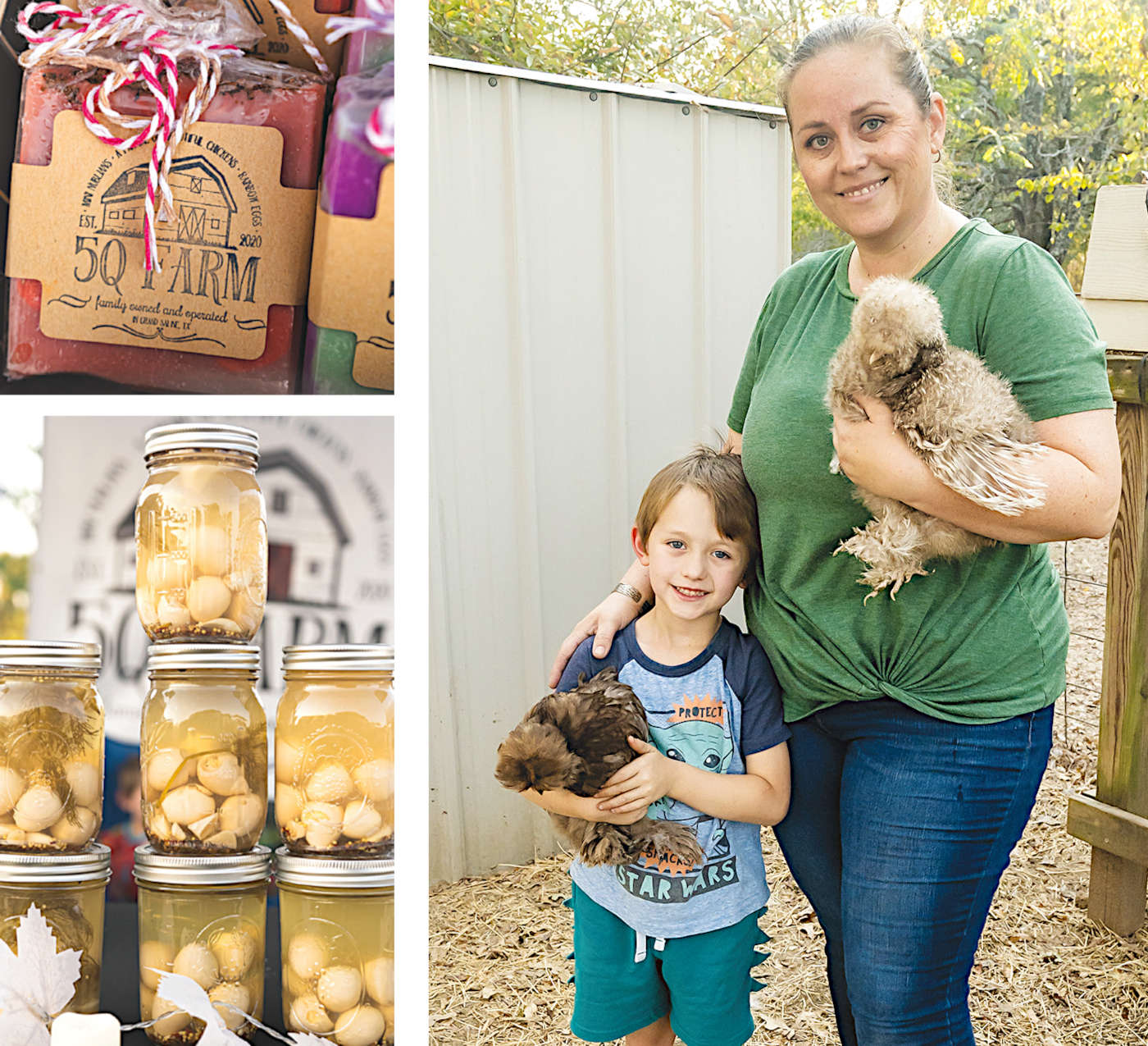
5Q FARM
Grand Saline
Courtney and Trevor Quinlan
When the Quinlan family moved to Grand Saline in 2018, their goal was to create a wholesome environment for their children. They launched the farm in 2020 with registered mini nubian goats.
As a first-generation farming family, they started small with gardens and a few animals, but it didn’t take long for them to catch the farming passion and expand. Alongside the goats, they raise chickens (Marans and Silkies), quail, ducks, Sebastopol geese and livestock guardian dogs to ensure the flocks’ and herd’s safety.
Poultry products offered at area farmers markets include whole chicken meat from cornish cross chickens, quail meat and eggs from all the feathered friends. They grow fresh produce and make pickles and pickled quail eggs, plus a variety of goat milk products: soaps, lotion, shampoo bars, all-natural hair products, beard products and body products. With mom Courtney as the driving force, they constantly explore and incorporate healthier alternatives into their lives and love passing on this knowledge to others through the introduction of new products.
With repeat customers at their various markets, word-ofmouth helps them grow. They offer limited farm tours and are excited to connect with and get to know customers when they visit the farm.
“To me, shopping local means supporting your neighbors who are starting to sell their bread or garden produce and buying from the small farmers who put so much into what they do for you to have quality products,” Courtney says. “It means taking the time to notice all of us that are here just attempting to help the community live a healthier way.
Everything you put into local gets put right back into the community. It really is a full-circle return investment.”
5Qfarm.com
Facebook @5Qfarm
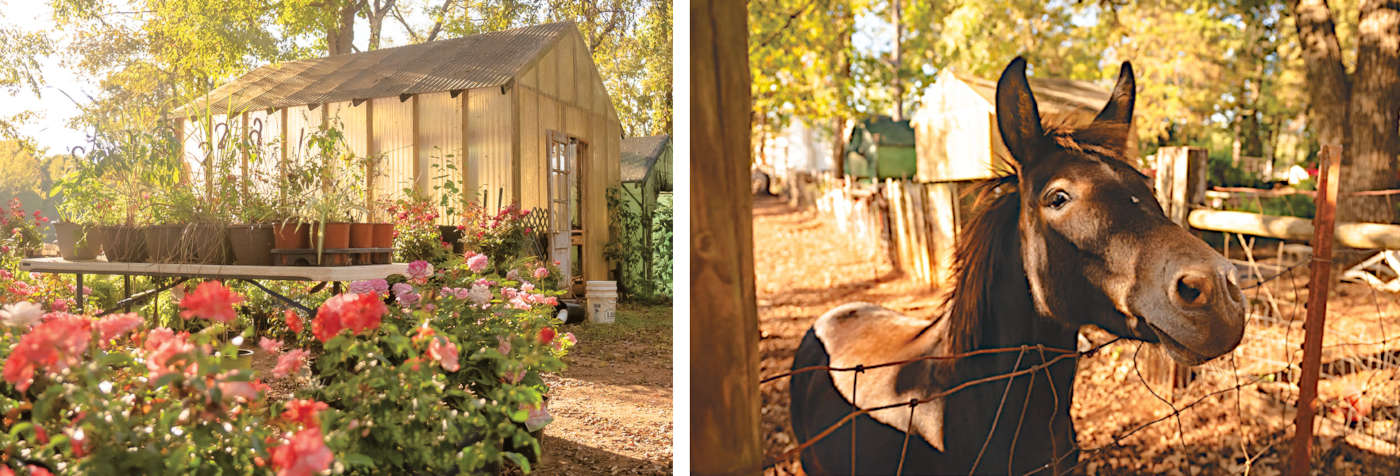
THE CLARK’S FAMILY FARM
Hawkins
Sharon Clark
In the Piney Woods just north of Tyler, you can wind your way on a red dirt road to a magical farm nestled next to Redlands Acres Lake. Sharon and Jeff Clark started The Clark’s Family Farm with honeybees in 2008 and gradually added chickens and a garden.
“Both sides of our family have past generations of farming experience, and for me it’s always been a dream and a goal,” Sharon says. “My husband and I started the farm for fun and we always gave our products away to friends. When he passed away three years ago, the farm became essential for my survival and self-sufficiency.” Determined to carry on her husband’s legacy, Sharon began to run the farm with the unwavering support of her family, neighbors and friends.
In addition to the beehives, the farm is currently home to four goats, with goat cheese production on the horizon.
Additionally, two donkeys named Gus and Thelma, a hog and Hank the pot-bellied pig reside on the farm, providing companionship alongside the dogs and cats who help safeguard the property. Sharon also tends to guineas and more than 40 chickens that produce approximately 30 eggs daily. She plans to expand her livestock by adding a couple of cows.
Sharing her passion and knowledge, Sharon offers free tours (by appointment; please text first) to explore the farm and pick veggies in season. The garden provides fresh produce, herbs and flowers, with herb and flower baskets, aloe vera and firewood for sale. Sharon also cans throughout the year, creating honey, jams, salsa, chow chow and vinegar onions.
Expanding beyond the farm’s agricultural offerings, an Airbnb cabin accommodates up to six guests, with additional open space for tent camping. Looking toward the future, Sharon will complete a second cabin in 2025 and begin hosting retreats that include horseback riding at neighboring Moser Family Farm plus visits to a local hidden treasure filled with walls of mosaic art created by children’s author Rita Moser.
Sharon’s commitment to farming serves as a reminder that nurturing a connection with the land directly contributes to the sustainability and well-being of the community. “Buying from local farmers really matters because we need each other. Directly connecting also opens your eyes to the needs of others and how you might help, which creates bigger change as a community. I don’t know exactly how to express it, but the feeling of being part of a greater community and supporting one another is powerful and priceless,” Sharon says. She ends her messages with“Peace, Love, Joy.”
theclarksfamilyfarm.com
Facebook @theclarksfamilyfarm
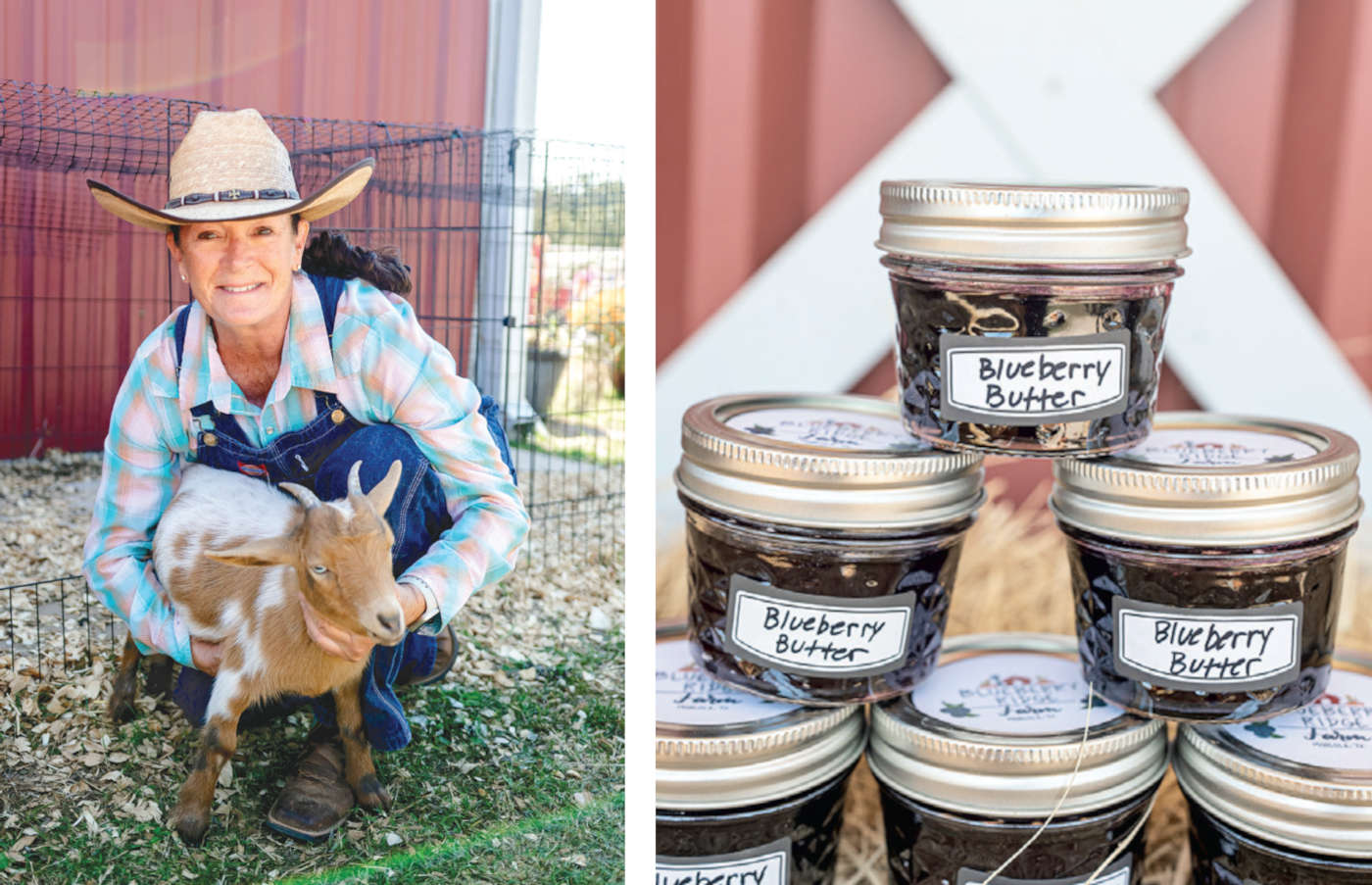
BLUEBERRY RIDGE FARM
Mineola
Jill and Jerry Graves
Sitting at the top of a hill just outside Mineola on Hwy 80 is a blueberry farm that beckons you to stop in. Blueberry Ridge Farm is a 70- acre homestead farm, purchased in 1992 by first-generation farmers Jill and Jerry Graves. At that time, 10 acres of blueberry bushes were grown and commercially harvested every year. Jill recalls that she’d never tasted a fresh blueberry.
“We traveled this road frequently and I always admired the farm. One day on our drive to Dallas, I saw the farm for sale. We were in our 30s and said, ‘Let’s just see what that would cost!’” Turns out they already had a connection with the property owner and were able to buy the farm with owner financing. They built a new house in 1999, raised children and started to work on the farm. Of course, Jill was relieved when she tasted her first fresh blueberry—and liked it.
In 2021, Jill retired from her 30-year teaching career, while Jerry continues to work full-time to support the farm. The organic blueberry patch is now a more manageable five acres, and they started the pumpkin patch four years ago. They’ve built a smaller home on the farm with the larger house now owned by their daughter, who has horses on the property.
The farm is open to the public for you-pick blueberries from June through July, and the pumpkin patch opens in October with familyfriendly hayrides and farm games. Area teachers bring classes for field trips, with parents and siblings able to attend. “Many kids don’t understand where their food comes from,” Jill observes. “When they come out, they get to see how pumpkins grow on the vine, learn about the growing season, and take a small pumpkin home. During blueberry season, they take a hayride to the blueberry patch to learn about the bloom and the importance of bees and cross-pollination.” They also get to visit the farm’s two rabbits and six goats and purchase some of Jill’s small-batch jams and salsa.
The popularity of Blueberry Ridge Farm continues to grow via social media and word of mouth. Like many small farms, after expenses, they are not making a profit, but one day they hope to. For now, they are content to welcome enthusiastic kids, retired seniors and the many small groups who come out and appreciate farm-style fun, Texas hospitality, homegrown food and fresh air.
blueberryridgefarm.com
Facebook BlueberryRidgeFarmMineola
WHY BUY LOCAL
The value of buying from local farmers and ranchers includes:
- Having a reliable source of locally available food.
- Making connections with the people raising, caring for and processing your meat, poultry and eggs.
- Relying on farmers who treat their animals and land with respect.
- Supporting a vibrant, local economy.
- Supporting a healthy, sustainable food system.
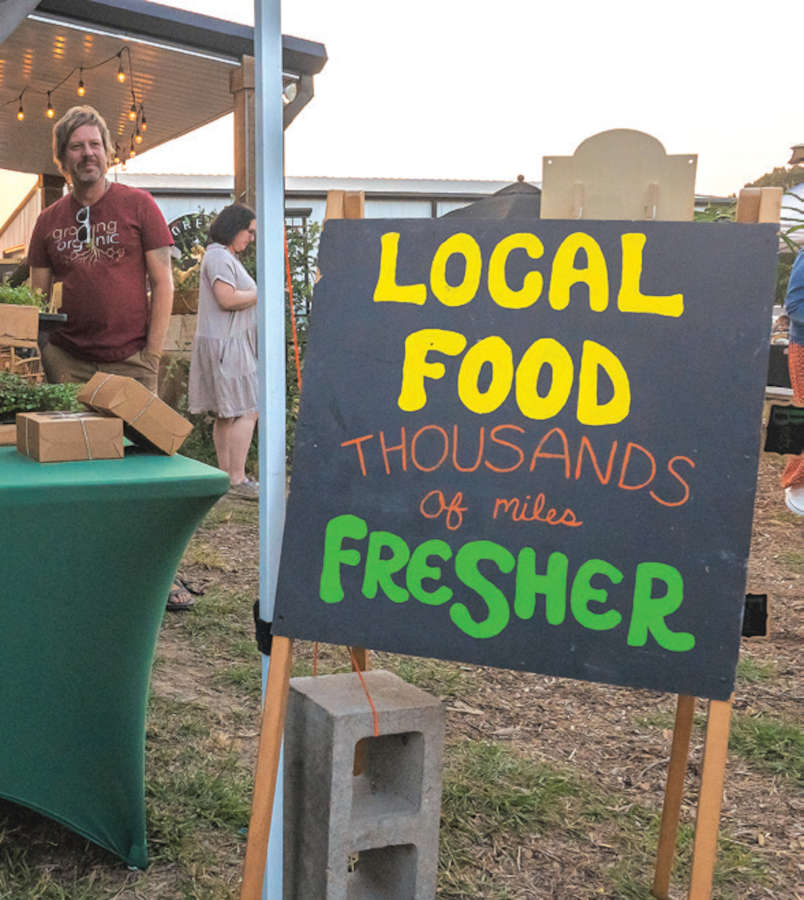
LOOKING FOR LOCAL?
Farmers markets Farmers markets play a big role in supporting our local food system, with small-scale farmers the backbone of these markets. While not every farmers market will exclusively feature vendors who source products from local farms, many are helping define “local” by establishing clear guidelines and parameters for vendor participation.
Roadside stands Keep an eye out for vendors selling fresh produce. Drive around, explore more rural areas and see what you find.
Social media and online marketplaces Join local food groups or follow farmers on social media platforms like Facebook or Instagram. You may discover food hubs like Profound Foods in North Texas, which connects consumers with local farmers, offering convenient ordering and delivery.
Community sources Ask local butchers, bakers or specialty food store owners for recommendations on nearby farmers; they may have direct relationships with local producers. And ask people you know who care about the quality of their food and where it comes from.
Visit local farm supply stores Many have bulletin boards or flyers advertising local farmers, what products they sell and where they come from.
Ask questions Farmers want to get to know you. Ask: What products do you offer? How do you grow or raise your products? Are they organic or sustainable? How can I purchase from you?
If you can, visit the farm directly to learn more about their operations. Take the time to “know your farmer.” And keep in mind that not all farmers participate in markets or online directories, so don’t be discouraged if you don’t immediately find them. Keep digging, and you’ll uncover what’s growing in your area.
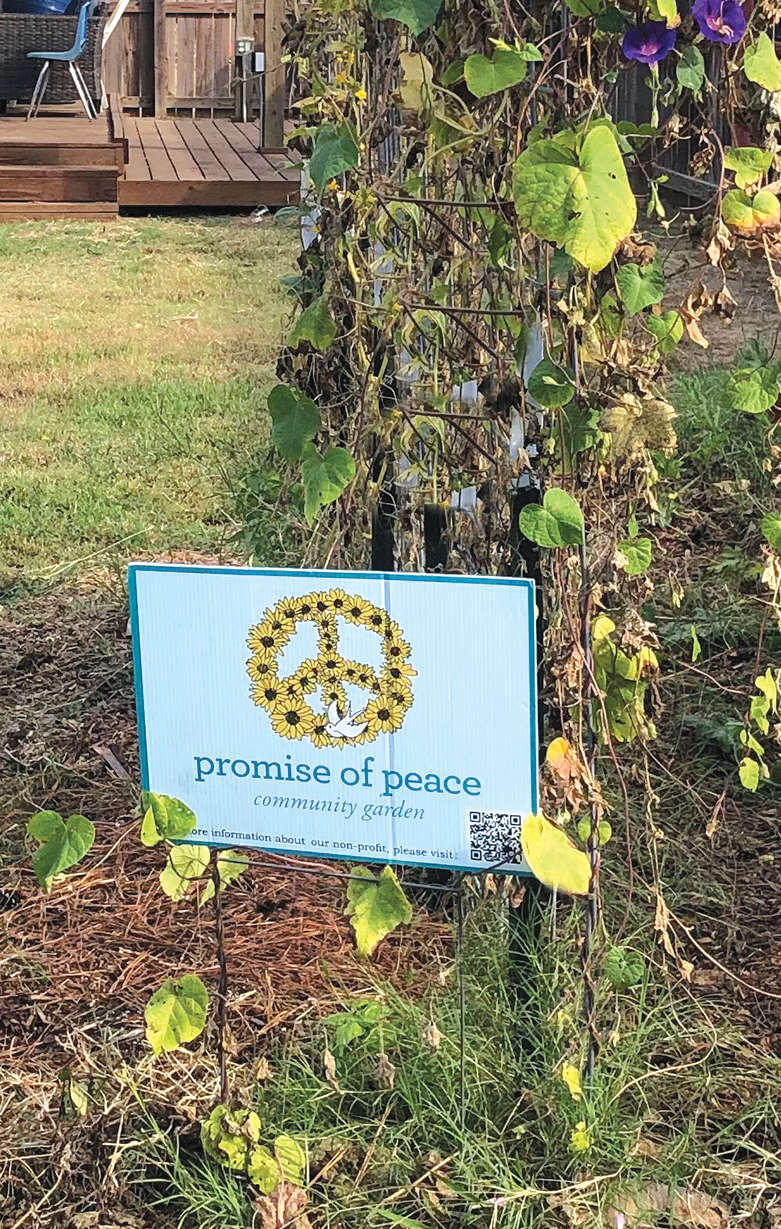
FOOD FOR THOUGHT
Farm-to-School update from Elizabeth Dry, founder of Promise of Peace Gardens In January 2022, Promise of Peace (P.O.P.) Gardens relocated from Dallas to Mineola, and the connections began growing with local producers and leaders of this beautiful Piney Woods area. Since that time, three P.O.P. food farms have been born. The people of Wood County have opened possibilities beyond our dreams, and our quest for food justice is evolving into the establishment of a 15-acre farm-to-school property in Mineola ISD that will change thousands of lives. Winter 2024 and spring 2025 will bring the funding, skills and people together as we grow the vision. Stay tuned.
There are many farmers to discover who live and grow in Wood County. I invite you to come and engage in agricultural experiences and during your visits be sure to connect with these farmers, stay in one of the local Airbnbs and enjoy the many treasured places you will find here.
- Stay connected to the Promise of Peace Gardens at promiseofpeace.us. To contribute or volunteer, call Elizabeth Dry at 214-240-9220.
Maria Whitworth is Director of Communications for Council for Healthy Food Systems, a non-prot org providing educational workshops for small farmers, giving them the business and marketing skills needed to tap into the growing demand for locally raised, pastured meats, poultry and eggs. HealthyFoodSystems.org
- Maria Whitworthhttps://www.edibledfw.com/author/mariawhitworth/
- Maria Whitworthhttps://www.edibledfw.com/author/mariawhitworth/
- Maria Whitworthhttps://www.edibledfw.com/author/mariawhitworth/
- Maria Whitworthhttps://www.edibledfw.com/author/mariawhitworth/


